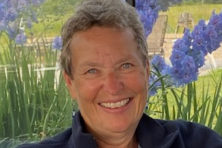Peninsula Poetry: Carrie Sherrill
- Share
- Tweet
- Pin
- Share

Carrie Sherrill has been writing since grade school – sometimes on paper, and always in her mind. She finds images in her garden, in snippets of eavesdropped conversations and through the eyes of her grandchildren.
Sherrill, a retired registered nurse and former caterer, has lived in Door County for more than 30 years. In addition to her nursing education, she earned a B.A. with an emphasis in creative writing and has attended the Summer Writing Workshop in Iowa City. Her poems have appeared in the Wisconsin Fellowship of Poets’ calendar and other regional publications.
Ellen Kort, Wisconsin’s first poet laureate, had the biggest influence on Sherrill’s writing because she belonged to a writers’ group that included Kort, Laurel Mills, Bruce Dethlefsen and others who provided critiques and encouragement. Sherrill’s husband, Peter, is also a published poet who provides support and advice.
Her Catholic upbringing, experience with both good and bad relationships, and long nursing career provide plenty of groundwork for Sherrill’s poems. She is intrigued by colors and the surprising places where they can be found. She is always observing and storing words and images.
What is your writing routine?
I need a fast-writing pen and a blank spiral notebook. Sometimes I write from prompts: perhaps a line from another poem, a newspaper headline, a photograph or a crayon color. I free-write (write without stopping) for at least 10 minutes; then I close the notebook and walk away. Sometimes for an hour, other times for years. When I go back, I glean words, images and phrases. I begin arranging, rearranging, adding, removing until the poem finds its way on the page. I leave the poem rest awhile, then revise, revise, revise until it feels right.
What do most poorly written poems have in common?
Poems that are too academic, either in form or language, are off-putting to me. Some poems require more revision. Every word needs to be essential. Sometimes trying to fit a poem into a form or rhyme scheme sacrifices the meaning and draws attention away from the words themselves. When I read a wonderful poem and realize later that it is written in a specific form, it can be very satisfying, but the form itself should not be the impetus for the piece.
What do most well-written poems have in common?
I like poems that have interesting words and phrases. Poems that provide a connection to the reader via memories or use of the senses are my favorites. Well-written poems have clean images and sometimes layers of meaning. They may need to be read more than once and then pondered. Parts of them stay with you, and call you back.
Is it important to understand the meaning of the poem or for the reader to be able to “solve” it?
I think it is important for the reader to find meaning in the poem, but not necessarily to understand the meaning. We may never understand completely the writer’s intention, or the levels of meaning in a poem, but as long as there is something to identify with, I think that is fine.
What book are you reading right now?
I just finished reading Braiding Sweetgrass by Robin Wall Kimmerer. It is a beautifully written blend of science, Native American teachings and care (or lack of care) for the environment. I am always working my way through The Artist’s Way by Julia Cameron. It is a guide to becoming the best “artist” you can, and each time through, I learn more about myself and my writing.
Peninsula Poetry is a monthly column curated by the Door County Poets Collective, a 12-member working group that was formed to publish Soundings: Door County in Poetry in 2015 and continues to meet.
Emergency Room, 4 a.m. Impending doom. You feel it in your gut, hear it in pauses of the paramedic’s radio report, see it reflected in the doctor’s glasses. Doom. The tin-like blood scent that is there before the actual hemorrhage. A rhythm you can’t correct, no matter how fast you arrive, how much you give, how long you work. Doom. The bedazzled look in the patient’s eyes, clouded questioning, the fear, pleading, and finally realization resignation. The turn-around When it’s you that they pity feeling sorry that no matter what you will feel failure, incompetence. Their eyes follow your hurried motions, try to catch your attention, to tell you it’s OK, you’ve done your best but it’s too late, and they fade color softens, something draws them up and out looking, searching the corner of the room, above the cot. And then calm. The lengthening pauses between breaths, first theirs and then yours. Your hesitant hand checks for a pulse closes the muted eyes the parched mouths first theirs, and then your own. June “And what is so rare as a day in June? Then, if ever, come perfect days …” James Russell Lowell, 1848 I want June freckles to appear across the bridge of my nose I want to smell like rain-kissed lilacs, splash in tepid puddles, sink my toes deep in cool sand I want to become June-like feel the hum of a buzzing bee see its path inside a succulent blossom I want to carry my words like pollen, share bits along the way. Save some in my mind’s hive let them settle in then retrieve them later to run like honey across the bleak winter page Night Shift, Labor and Delivery A memory in color Blue veins of mother’s neck stand out through urgent pushes I watch, breathless and wide-eyed as blue scalp, pacific blue no, purple- appears and recedes with each contraction finally blue gloved doctor hands bloodstained now scissor the long, straight cut the whole head erupts blue, grimaced face silent mouthed cry twisted red-violet and pacific blue undulating umbilical cord wrapped tight around newborn neck limp body slithers out downy skin, closed eyes all so blue Mother’s panic evident her bloodshot blue eyes search the quiet room doctor works fast, loosens then unwinds the cord immediate flush of pink loud, red squeal Mother cries ocean blue tears her red-violet lips kiss this new life and blue waves of relief wash the room She is lovely She is here.
One Nation Indivisible, 2019 Cities are spattered with red blood of the black and the white and the brown people of our country Guns know no color Borders are bursting children separated from mothers search for food, for water, for a better life We build our wall Ice caps melt, rivers rise air pollutes lungs, water unsafe to drink forests slaughtered We count our dollars We are far beyond Ginsberg’s Howl A constant white noise pervades politicians spew fetid lies repeating rephrasing repeating Until they believe we believe We don’t know what to believe The chasm is wide Black versus white man versus woman American versus immigrant Democrat versus Republican We must come together gather our strengths state our truths open our hearts silence the wail of our nation Can poetry save the world?
Write Write about wind in trees green waves of needles, soft and blowing Write about bare, gray branches waiting for bud burst, thinking chartreuse Write about how apple blossoms perfume spring air, their white flush in rows of the orchard See tinted pink blooms, bees flitting blossom to blossom to blossom Bees perpetually taking care of us Think golden honey clear and sweet in the comb, in the jar, in our tea Make connections: tree-blossom-bee-honey word-line-stanza-poem Work. Hard work of writing thinking and not thinking letting ink write on its own writing wild and fast See the words, smell them taste them, devour them hear their shouts as they vie for a place on the page Try them in different positions: end rhymes, alliteration, nouns, verbs, adjectives Use a lot of them, then pare them down Stark Spare Each word an essential purpose Let them speak for themselves Titles. Beginnings. Endings. Scrap the first six stanzas keep the haiku leave interpretation to the reader Walk away.


